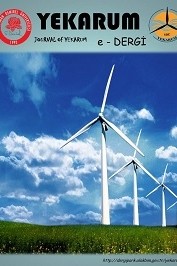Enerji Araştırmalarına Antropolojik Bir Yaklaşım
Bilimsel çalışmalarda disiplinler arası yaklaşım giderek yaygınlaşmaktadır. Özellikle sosyal bilimlerin fen ve mühendislik gibi alanlarda kullanımı giderek artmaktadır. Antropoloji bilimi insanı ve insana dair her şeyi kendine araştırma konusu edinen bir bilim disiplinidir. Dolayısı ile insanla ilişkili her bilimsel araştırma, antropolojiyi de içermektedir. Günümüzde enerji, günlük yaşantımızın en önemli unsuru haline gelmiştir. Enerjinin yaşantımız üzerindeki egemenliği, ona olan ihtiyacın artmasına ve sonuç olarak azalan enerji kaynakları ile birlikte etkin enerji kullanımı ve enerji tasarrufu gibi konuların gündeme gelmesine, bu alanda politikalar üretilmesine neden olmuştur. Ancak etkin enerji kullanımı, tüketim ve tasarruf gibi unsurları konu alan bu politikaların başarıya ulaşması kültürel, toplumsal ve bireysel alışkanlıkların ve örtük bilgilerin belirlenerek çözüm üretilmesi ile ilgilidir. Bu çalışmada, enerji konusundaki araştırmalarda insan davranışı odağının, antropoloji bakış açısı ile bir değerlendirmesi yapılacaktır.
Anahtar Kelimeler:
Antropoloji, örtük bilgi, enerji tüketimi, enerji tasarrufu
An Anthropological Approach to Energy Research
Scientific research in interdisciplinary studies has become use still widely over the time. Especially, the influence of social sciences in fields such as physical sciences and engineering is increasing. Anthropology is the science of research of everything related to human and humanity. Therefore, anthropology involves any scientific research about human. Today, energy has become the most important component of our daily lives. Dominance of the energy on our lives increases the demand for it, which causes consumption of active energy sources. Consequently, topics such as consumption of active energy and energy conservation become hot topics in state agenda and causing generation of new policies. However, it is unclear that how much these active energy consumption and conservation related policies effect individuals and the society and being applicable? In this study, the focus of human behavior in energy related researches will be examined in an anthropological perspective
Keywords:
Anthropology, tacit knowledge, energy consumption, energy conservation,
___
- Conrad P Kottak, Antropoloji: İnsan Çeşitliliğine Bir Bakış (Çev: Sibel Özbudun), 6. Baskı, Ütopya Yayınevi, Ankara, (2002).
- Robert M. Emerson, Rachel I. Fretz, ve Linda L. Shaw, Bütün Yönleriyle Alan Çalışması: Etnografik Alan Notları Yazımı (Çev. A. Erkan KOCA), 1. Baskı, Cantekin Matbaası, Ankara, (Ekim 2008).
- Michael Polanyi, The Tacit Dimension, Doubleday&Company, Inc., Garden City, New York, (1966).
- Harold Wilhite, “Anthropological perspectives on practice theory and efforts to reduce energy consumption”, For Lancaster University workshop, Practice theory and climate change, (6-7) (July 2010).
- Harold Wilhite, “Energy is a social good: implications for behavioural research and energy efficiency policy”, Panel of the Energy Conference, http://www.eceee.org/conference_proceed ings/EE_and_Behaviour/2009/Intro_plena ry/Intro_1.01/paper Behaviour (2009),
- Rita J. Erickson, “Energy and Environmental Awareness in Swedish and American Households”, 1996 ACEEE Summer Study Proceedings Paper, American Council of an Energy Efficient Economy, (p.8.61-8.69), http://eec.ucdavis.edu/ACEEE/1994- 96/1996/VOL08/061.PDF. (1996),
- Joy H. Wang, “Behavioral Policy Modeling: Consumers Resindential Energy Consumption, (April 1, Impacts on 2011), http://www.spp.gatech.edu/faculty/WOPR papers/Wang.WOPR11.pdf.
- Loren Lutzenhiser, “Behavioral Assumptions Unserlying California Residential Sector energy Efficiency Programs”, California Institute for Energy and Environment, (April, 2009).
- Mithra Moezzi, “Social Meaning of Electric Light: A Difference History of the United States”, Human Dimensions of Energy Consumption Summer Study on Energy Efficiency in Buildings. Washington, D.C.: American Council of an Energy Efficient Economy, (p.8.123-8.132), (1996). ACEEE
- Başlangıç: 2010
- Yayıncı: Süleyman Demirel Üniversitesi
